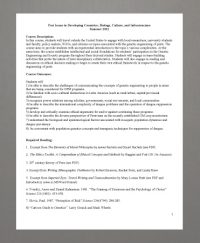Course 1
This is a summer course that occurs before a student cohort’s first campus classes begin. The first year, this course was taught in Peru, the second year our students visited the Channel Islands, and the third year they traveled to Mexico. The major goals of this course are: 1) team building and 2) acquiring first-hand knowledge of the environments where many of the products of GPM are targeted for use. The course is held in the last week of July and the first two weeks in August. Haenn and Gould co-coordinated the course and accompanied students for the entire three weeks. Other IGERT faculty participated in the course for four to seven days. David Auerbach (Philosophy) developed specific readings and case studies on ethics for participants to discuss during the course.
During the course we engaged with local researchers, university students/faculty, policy makers, NGOs, and citizens. We have established research and educational collaborations in Peru. These collaborations range from mosquito GPM research programs, to anthropological studies of how biological processes are understood by citizens in rural communities.
Interactions of our students with our collaborators have ranged from lectures and discussions, to hands on research and interviews of local families. Contrasts between urban and rural cultures were highlighted. Evenings are used for formal and informal lectures and discussions within our group on culture, ethics and pest management issues.
Baseline learning outcomes
After completing the course, students will be able to:
- Describe the challenges of communicating the concepts of genetic engineering to people in areas that are being considered for GPM programs,
- Understand the diversity of cultural perspectives in rural and urban areas of Peru and describe the typical family structures in those areas,
- Identify the existence of different scientific traditions, including the ethno-ecological frameworks employed by a lay public,
- Recognize power relations among scholars, governments, social movements, and local communities,
- Describe the international complexity of dengue problems and the operation of the Gates Foundation transgene-based dengue program,
- Develop and critically examine ethical arguments for and/or against continuing these programs,
- Write a substantive essay about each student and faculty member in the IGERT group.
